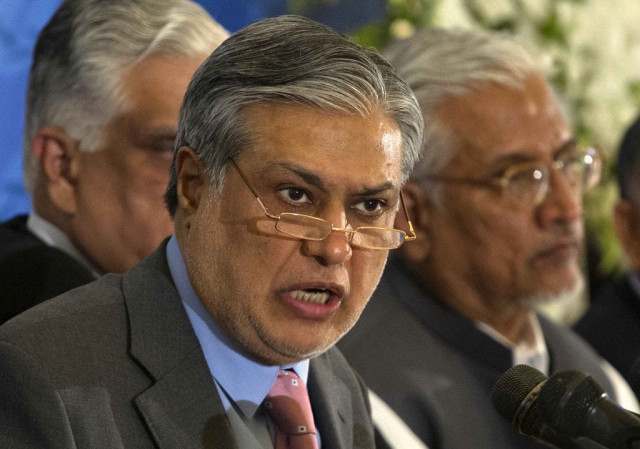Dar sticks to old stance, rejects demand for rupee depreciation
With limited resources, PM forms committee to address exporter woes

Ishaq Dar. PHOTO: REUTERS
Abbasi met with a delegation of the All Pakistan Textile Mills Association (Aptma) - the representative body of exporters - in order to find a solution to the constant decline in exports over the past four years.
The premier expressed the desire that industrialists should work to enhance exports to $30 billion in the short term - an increase of 50% over last year’s total exports. But he conceded that the federal government did not have enough fiscal space and recommendations should be made while keeping this in mind, according to officials who attended the meeting.
The meeting was held a week after the Economic Coordination Committee of the cabinet amended the PM’s Export Package that partially addressed the exporters’ concerns.
Pressure mounts on Ishaq Dar to quit
The delegation demanded that the export package should be extended to five years instead of one year, its benefits should be available only to the domestic raw material users and the cost of electricity should be cut by about 27%.
However, Finance Minister Ishaq Dar was not very receptive to these demands and insisted that the government had already given significant concessions to the exporters, said a participant of the meeting.
Dar was also not ready to accept the demands for exchange rate depreciation and reduction in electricity tariffs due to their implications for the budget.
In order to find a middle ground, the prime minister constituted a committee - second in the last one year, which would be headed by Commerce Minister Pervaiz Malik.
The previous committee was chaired by Dr Miftah Ismail, who is now a close confidant of Abbasi.
“In order to improve the situation, the prime minister has to take things in his own hands,” said Gohar Ijaz, Patron-in-chief of Aptma, while talking to The Express Tribune.
He said the industry could not compete with regional peers with a high cost of doing business.
'Dar misled Nawaz Sharif on economic issues'
Aptma also demanded that the government withdraw the Rs3.53 per unit surcharge on the electricity consumed by the industries to bring the tariff in line with regional competitors. Electricity tariff should not be more than Rs7 per unit, according to Aptma.
Similarly, it said against the current end-user gas price of Rs1,000 per mmbtu in Punjab, the re-gasified liquefied natural gas should be provided at a uniform price of Rs600 to industrial consumers for use in both captive plants and processing across the country.
However, the finance ministry was not willing to withdraw the Gas Development Surcharge that had significantly increased the cost of gas for the industries.
Aptma also demanded that incentives under the PM package should be available only to indigenous raw material in the value chain. Currently, some industrialists were importing dyed cloth from India duty free and exporting it by adding little value, said Ijaz. He said this practice should be ended.
The textile industry has to catch up with its international competitors on a level playing field in the cost of production.
He said energy was an important element of the cost of production, particularly for spinning, weaving and processing industries. Its share has become more than 35% of the total conversion cost. Its availability at regionally competitive prices is important.
Weaving and spinning industries in Punjab had closed down and they could only be revived by reducing the cost of doing business, said Ijaz.
He said system gas/RLNG was burdened with various incidental charges such as GIDC/UFG, cost of supply, etc, but the export industry could not pass on these system inefficiencies to international buyers.
Aptma also demanded swift clearance of their tax refunds against which Refund Payment Orders had been issued till September 30.
Published in The Express Tribune, October 14th, 2017.
Like Business on Facebook, follow @TribuneBiz on Twitter to stay informed and join in the conversation.





1733130350-0/Untitled-design-(76)1733130350-0-208x130.webp)











COMMENTS
Comments are moderated and generally will be posted if they are on-topic and not abusive.
For more information, please see our Comments FAQ